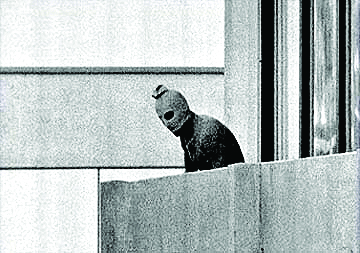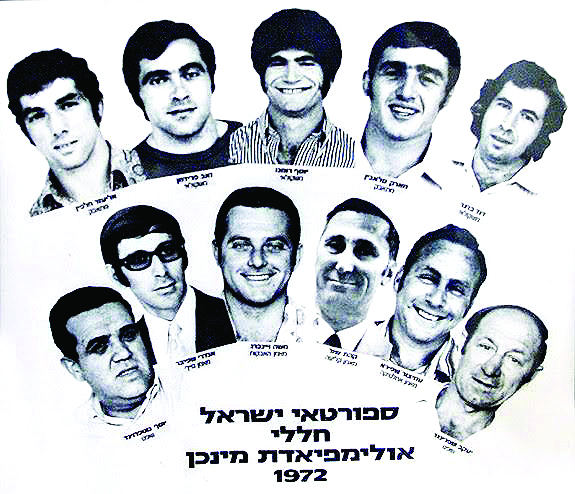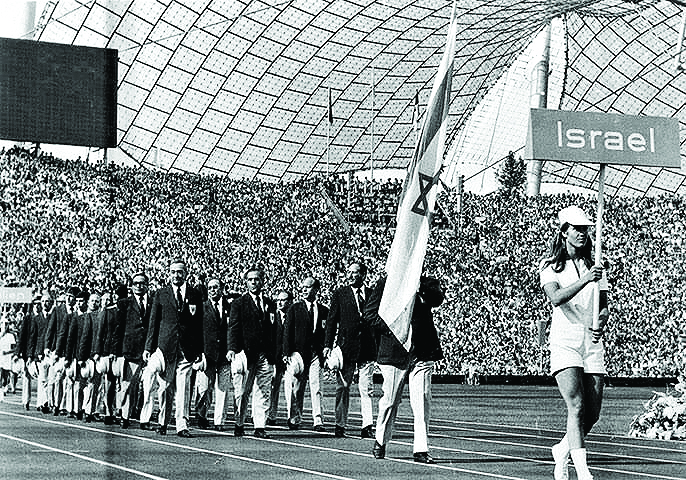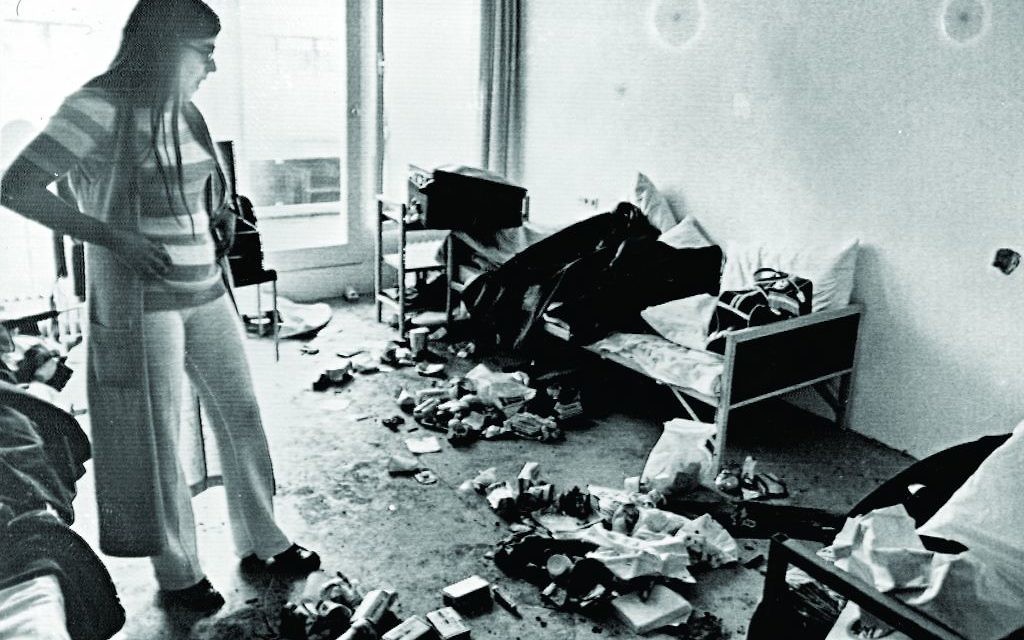Munich: The new evidence
A new film reveals never-before-seen evidence about the torture of Israeli athletes at the 1972 Olympic Games
More than 40 years on, the pain for Ilana Romano, widow of one of the 11 Israeli athletes murdered at the 1972 Olympic Games, is still so very raw.
There is little comfort in discovering that her husband was brutally tortured by Palestinian terrorists in Munich, but she and others are perhaps one step closer to discovering exactly what happened and who was responsible for such a heinous act following the release of 900 photographs and more than 4,000 documents by the German government.
The never-before-seen evidence, which includes grisly photographs of the murder scene, features in a new documentary, Munich ’72 and Beyond, which has its UK premiere at JW3, next Thursday.
Get The Jewish News Daily Edition by email and never miss our top stories Free Sign Up
For Ilana and Ankie Spitzer, widow of fencing coach Andrei Spitzer, there were mixed emotions over whether to include a distressing photo showing Yossef Romano, a champion weightlifter, who was castrated by his kidnappers and left to bleed to death in front of his teammates.
“Ankie and I sat in front of each other. I said: ‘Ankie, I cannot show these photos to the families, I’m just unable.’ These were very, very difficult photos to see,” she recalls in the film.

The emotional impact was also hard for Mika, sister of wrestler Mark Slavin, who recalls her tearful father begging she would never ask to see the photos, which also reveal the hostages endured beatings and broken bones and were tied by their hands and legs to the bedposts.
But Spitzer took a different approach, believing theywould help show the terrorists did not just want to take hostages, but intended to carry out cold-blooded murder.
As she explains in the film: “Justice has to be done for these people, because they didn’t come with guns, they were not on the battlefield. They came to take part in the peaceful, joyful, brotherhood that is the Olympic Games.
“But this is not what happened to them. They spent their last hours in fear, being humiliated, being tortured, being castrated.”
Producer Steven Ungerleider says the discovery of the evidence, which the German police denied even existed for decades after the event, left everyone feeling “shocked and pained,” but the families agreed to include the material in the documentary.

“They said: ‘We’ve never released this, but we think the world needs to know this was not just a terrorist attack played out to millions of people around the world on television. This was torture, intentional killing and murder at the highest level, with the intent to do harm. We want these photos shown.’”
Alongside interviews with relatives, historians and former athletes, Ungerleider and director Steven Crisman also secured the participation of Palestinian journalists Raed Othman and Ziad Zayyad to comment on the events of 5 September 1972.
Both argue the Palestinian terrorist group Black September was tasked with taking the Israeli hostages in a bid to demand the release of 234 prisoners and “to present the Palestinian case to the world”. Othman adds that using violence or killing the hostages was only to be used as a last resort.
But as the documentary presents evidence from German police files, it becomes clear the terrorists had deadly intentions.
Ungerleider, who works as a sports psychologist with the US Olympic committee, explains: “Those interviews were very hard to get, but clearly that was a smokescreen. The intent was to get the Israelis and trade them for the prisoners and they were not given any restrictions. The weapons they carried in were enough for a military operation and included hand grenades, bombs and automatic weapons.
“This was not just a hostage-taking, their intent was to murder them. We respect and appreciate what [Othman and Zayyad] said, but it did not square with the truth.”
The film also highlights the bungled security organised by the Germans at the 1972 Olympic Games, a factor that heavily contributed to the massacre taking place. The budget set for security was just £80,000, while that at the most recent games in Rio was just under £1billion.

“It was a really bungled, poor security situation and the Germans fell short. They were warned ahead of time and they were liable.”
Equally contentious is the fact the Games were allowed to continue just hours after the horrific 20 hour-long incident came to its end, with a botched rescue at a nearby airport.
In the wake of the murders, Ungerleider reveals there was anxiety surrounding security and many participants wanted to return home. President Nixon arranged for a private plane to bring home champion swimmer Mark Spitz and other Jewish athletes, “because they didn’t know how this would unfold”.
Was it right for the Olympics to continue? “People were so traumatised that how could they go on when 11 bodies in coffins had to buried?” asks Ungerleider. “It doesn’t seem appropriate. But the flipside – today’s theory since 11 September – is that we are not going to let the terrorists win.”
As the film shows, the pain of 1972 continues for those left behind, but Ungerleider believes “the healing has begun,” helped by the memorial ceremony at the Rio Olympics and plans for an official memorial in Munich.
“This is a critical turning point,” adds Ungerleider, who is a special consultant to the International Olympic Committee. “For 44 years, relatives and survivors have been clamouring for an acknowledgement and reconciliation. The memorial will be a pivotal moment in the history of the Olympic movement.”
• Munich ’72 and Beyond is at JW3 on Thursday, 27 October at 8pm.
Details: www.Jw3.org.uk

Thank you for helping to make Jewish News the leading source of news and opinion for the UK Jewish community. Today we're asking for your invaluable help to continue putting our community first in everything we do.
For as little as £5 a month you can help sustain the vital work we do in celebrating and standing up for Jewish life in Britain.
Jewish News holds our community together and keeps us connected. Like a synagogue, it’s where people turn to feel part of something bigger. It also proudly shows the rest of Britain the vibrancy and rich culture of modern Jewish life.
You can make a quick and easy one-off or monthly contribution of £5, £10, £20 or any other sum you’re comfortable with.
100% of your donation will help us continue celebrating our community, in all its dynamic diversity...
Engaging
Being a community platform means so much more than producing a newspaper and website. One of our proudest roles is media partnering with our invaluable charities to amplify the outstanding work they do to help us all.
Celebrating
There’s no shortage of oys in the world but Jewish News takes every opportunity to celebrate the joys too, through projects like Night of Heroes, 40 Under 40 and other compelling countdowns that make the community kvell with pride.
Pioneering
In the first collaboration between media outlets from different faiths, Jewish News worked with British Muslim TV and Church Times to produce a list of young activists leading the way on interfaith understanding.
Campaigning
Royal Mail issued a stamp honouring Holocaust hero Sir Nicholas Winton after a Jewish News campaign attracted more than 100,000 backers. Jewish Newsalso produces special editions of the paper highlighting pressing issues including mental health and Holocaust remembrance.
Easy access
In an age when news is readily accessible, Jewish News provides high-quality content free online and offline, removing any financial barriers to connecting people.
Voice of our community to wider society
The Jewish News team regularly appears on TV, radio and on the pages of the national press to comment on stories about the Jewish community. Easy access to the paper on the streets of London also means Jewish News provides an invaluable window into the community for the country at large.
We hope you agree all this is worth preserving.
-
By Brigit Grant
-
By Laurent Vaughan - Senior Associate (Bishop & Sewell Solicitors)
-
By Laurent Vaughan - Senior Associate (Bishop & Sewell Solicitors)
-
By Laurent Vaughan - Senior Associate (Bishop & Sewell Solicitors)
-
By Laurent Vaughan - Senior Associate (Bishop & Sewell Solicitors)






















